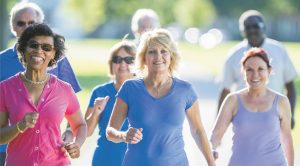By Melissa MacVenn, M.D. – WellcomeMD Naples


Lead researcher Kaitlin Casaletto of the University of California San Francisco Memory and Aging Center found that in older people, physical activity may prevent or delay Alzheimer’s disease and its memory loss and other cognitive issues. The long-term study monitored movement, regularly tested memory and other cognitive skills, and examined brain tissue. The findings are not subtle.
We’ve known some of this information from earlier research, but it has not been scientifically confirmed until now: the activity needed to see these benefits is not large. You do not need to train for a marathon or start power lifting. You just have to move. A regular routine consisting of a 30-to-60-minute walk once a day is sufficient. That’s the encouraging news I’ll be telling my patients at WellcomeMD Naples.
Dr. Casaletto told a reporter that there was a direct relationship between how much the people in the study moved and their brain health. Few had formal exercise routines, she said, but “the less they sat, the more they stood, the more they moved around, the better their outcomes.”
The research also broke new ground by examining the brain tissue of 167 participants who died while it was underway. Those who had been physically active on a regular basis generally showed much less evidence of Alzheimer’s. Some of the “movers” had physical brain changes associated with Alzheimer’s, but often had fewer memory issues or other cognitive losses than those who moved less. There is also evidence that even if you’ve noticed some cognitive issues like memory loss as you age, exercise can sometimes diminish them.
Once again: it doesn’t seem to take much movement. Walking or standing is better than sitting. Most adults can’t feasibly exercise or move around the entire day, but if you can, get up and move your legs and feet or even walk in place.
I have more time than some to work new research findings like these into my practice, and I was glad to see it confirmed. Get more movement into your day for your overall health and the function of your precious and intricate brain.
Looking for Guidance on Making Healthy Choices?
The journey to optimal health looks different for everyone, and WellcomeMD can help! We restrict memberships so that I have more time with each of my patients, and they have far more access to time with me. And our certified health coaches help our members reach their goals and find their happiest, healthiest version of themselves.
WELLCOMEMD
Living well means making the choice to start today. Membership medicine (sometimes called “concierge medicine”) re-establishes the kind of personal relationship with your physician that was once commonplace. We take advantage of the many advances in treatment and technology – treatment is more personal, more pro-active, and more effective.
• Consider the cost of avoiding a preventable disease, the value of early detection of serious health problems, and ready access to a doctor who knows you well.
• Unhurried, 30-minute consultations or video conference appointments — or just a quick call or text – you choose.
If you are ready to optimize your health and have options and programs custom-tailored to your specific needs, contact WellcomeMD today at (239) 451-5105 or wellcomemd.com/naples-florida.
 Southwest Florida's Health and Wellness Magazine Health and Wellness Articles
Southwest Florida's Health and Wellness Magazine Health and Wellness Articles
